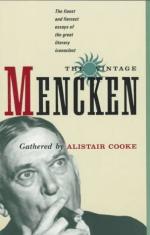
|
| Name: _________________________ | Period: ___________________ |
This test consists of 15 multiple choice questions and 5 short answer questions.
Multiple Choice Questions
1. Who was FDR's chief opponent in the Democratic Convention of 1932?
(a) William Randolph Hearst.
(b) Woodrow Wilson.
(c) Al Smith.
(d) Henry Cabot Lodge.
2. What was the nature of the analogy Mencken uses involving Oliver Wendell Holmes, a hammer, and a feather?
(a) Holmes wrote with a feather (quill), but legislated with a hammer.
(b) Holmes tickled with feathers, but never punished with a hammer.
(c) Holmes touched the sky with feathers, and then built a castle in the sky with a hammer.
(d) Holmes stuffed a mattress with feathers, but then beat the mattress flat with a hammer.
3. What would best describe Mencken's attitude toward Oliver Wendell Holmes?
(a) He was a quack chiropractor.
(b) His rulings were thoroughly corrupt.
(c) He was a Liberal hero in name only.
(d) He was a fantastic advocate of progressive causes.
4. What did Mencken conclude in his examination of rulings in "Mr. Justice Holmes"?
(a) Mencken slyly suggests Holmes should tuck chickens under his arms because of his chicken-like cowardice.
(b) Justice Holmes ruled too often in favor of the powers that be, rather than the people.
(c) Justice Holmes ruled too often for rabble-rousers, and not often enough for the aristocracy.
(d) Justice Holmes rendered fantastically bizarre rulings, and should be impeached.
5. What was Mencken's general opinion of religion at the end of "Holy Writ"?
(a) Religion is evil, and should be outlawed.
(b) Religion is a pretty silly business.
(c) Religion is a great good, and responsible for much of what is good in civilization.
(d) Religion is valuable, but flawed.
6. How did Mencken describe the music of Bach?
(a) "Genesis I, I"
(b) "The Deaf leading the Equally-Deaf."
(c) "Silver macaroni, exquisitely tangled."
(d) "Heaven upon a creamy macaroon."
7. According to "Exeunt Omnes," Mencken was disappointed with the amount of books dedicated to which subject?
(a) Democracy.
(b) Adultery.
(c) Death.
(d) Taxes.
8. In "Travail," how did the boys going to school in the morning seem to Mencken?
(a) Energetic and hopeful.
(b) Upbeat and joyous.
(c) Tired and sad.
(d) Like they might someday conquer the world.
9. Which of the following was NOT an attribute of an artist, as Mencken describes in "The Artist"?
(a) The artist is patriotic.
(b) The artist is more easily wounded.
(c) The artist turns against his country and countrymen.
(d) The artist is more sensitive to his environment than normal people.
10. What was the source of Oliver Wendell Holmes' allure?
(a) His eloquent, epigrammatic writing style.
(b) His ability to bribe officials at every level of government.
(c) His ability to stick to the facts and write sound legal opinions.
(d) His personal charisma and sometimes outrageous court antics.
11. What was the flaw of FDR's opponent in the Democratic National Convention of 1932?
(a) He was ruined by a scandal involving adultery.
(b) He was too old, and he looked like a mummy next to FDR.
(c) He was blinded by his hatred for FDR.
(d) He was a complete political rookie.
12. What was the result of Mencken's attempt to trace the lineage of the Anglo-Saxon race?
(a) It was too complicated, and he gave up.
(b) He pointed out that the race was never the same after a battle in 1066.
(c) He traced it to a tribe in Western Africa.
(d) Mencken claimed, sarcastically, that he himself represents the apex of the race.
13. What was the subject of "The Noble Experiment"?
(a) Voting during World War I.
(b) Drinking during Prohibition.
(c) A scientific breakthrough Mencken reported on.
(d) The Cuban revolution.
14. What event did Mencken cover in "The Wallace Paranoia"?
(a) The Progressive Party convention.
(b) The marriage of a governor.
(c) A socialite's ball.
(d) The New York World's Fair.
15. What might Mencken say about a writer's sense of beauty?
(a) The writer has a profound sense of beauty.
(b) Beauty is irrelevant to the writer, who must deal with cold, hard facts.
(c) The writer has a very poor sense of beauty.
(d) The writer has an average sense of beauty.
Short Answer Questions
1. Why, according to Mencken, do virtuous people end up sinning the worst?
2. What criticism did Mencken have for a book filled with sayings and writings about death?
3. How had Wallace behaved in "The Wallace Paranoia"?
4. Where did the Scopes monkey trial take place?
5. What happened when Mencken sent a junior reporter to get him liquor during the Republican National Convention?
|
This section contains 843 words (approx. 3 pages at 300 words per page) |

|




